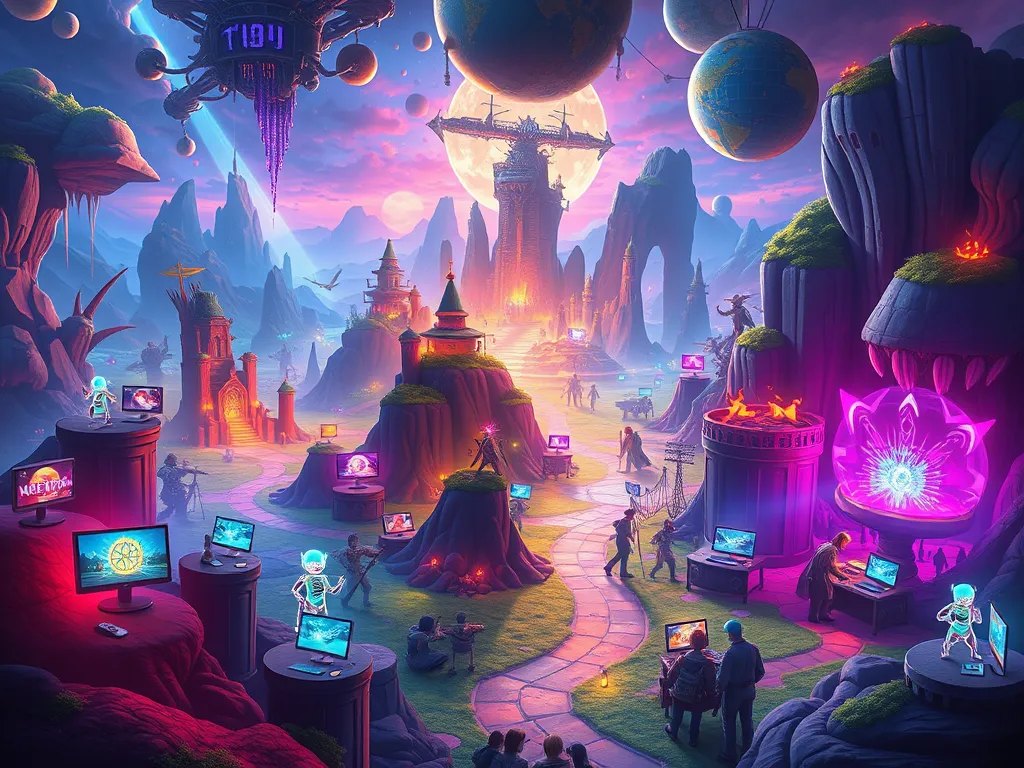Exploring The Rise of Multiplayer Gaming Communities

The Rise of Multiplayer Gaming Communities
The rise of multiplayer gaming communities has transformed the way players engage with video games. What began as a niche hobby has blossomed into a global phenomenon, fostering social connections, competition, and shared experiences among millions of gamers. As technology has advanced, so too has the ability for players to connect and collaborate, making multiplayer gaming a staple in the gaming industry. This article explores the various aspects of the rise of multiplayer gaming communities and their significant impact on players and the gaming landscape as a whole.
At the heart of the rise of multiplayer gaming communities is the evolution of online gaming. The ability to connect with friends or strangers from around the world has made gaming more interactive and enjoyable. From early LAN parties to the advent of online platforms, multiplayer gaming has become a social experience that transcends geographical boundaries. This evolution reflects a cultural shift in gaming, where solitary gameplay is increasingly complemented by community engagement.
Furthermore, technological advancements have played a vital role in the rise of multiplayer gaming communities. Enhanced gaming servers, faster internet connections, and improved gaming consoles have enabled seamless multiplayer experiences. High-quality graphics and immersive sound design have transformed the gaming landscape, attracting new audiences and fostering deeper connections among players. As a result, multiplayer gaming has become a mainstream activity rather than a niche interest.
The rise of multiplayer gaming communities is also characterized by historical milestones that have shaped the genre. Landmark games have paved the way for new genres and gameplay mechanics, while major releases have garnered large, dedicated player bases. This blend of innovation and community engagement has created a vibrant ecosystem where gamers can find their niche and interact with like-minded individuals, leading to a strong sense of camaraderie and competition.
In conclusion, the rise of multiplayer gaming communities is a phenomenon that has fundamentally changed the gaming experience. The combination of technological advancements, social engagement, and historical milestones has created a thriving environment where players can connect and collaborate in unprecedented ways, leading to a richer gaming ecosystem.
Evolution of Multiplayer Gaming
From the early days of multiplayer gaming, where players would gather in local networks for LAN parties, to the widespread online multiplayer that we see today, the evolution has been remarkable. LAN parties created a social atmosphere where friends could play together, but the introduction of the internet brought gaming to a global audience. Suddenly, players could connect with others across the world, forming friendships that transcended physical locations. This shift marks a significant turning point in how multiplayer gaming communities developed and flourished.
Technological advancements in gaming servers have played a pivotal role in the rise of multiplayer gaming communities. With the advent of dedicated servers, developers can now host games that accommodate thousands of players simultaneously. This has enabled smooth, lag-free gameplay and created environments where large communities can gather, strategize, and compete. Cloud gaming and improved bandwidth have further enhanced these experiences, ensuring that players can connect and enjoy multiplayer games without interruption.
Historical milestones in multiplayer game development highlight the growth and importance of these communities. Major titles such as "Doom" and "Counter-Strike" laid the foundation for competitive gaming, while MMORPGs like "World of Warcraft" introduced expansive worlds where players could team up or fight against each other. These games not only pushed the boundaries of what multiplayer gaming could achieve but also laid the groundwork for community-driven content, events, and expansion packs that continue to engage players.
The rise of technology has revolutionized how we experience entertainment, particularly in the realm of Multiplayer Gaming.
Impact on Social Interaction
One of the most profound effects of the rise of multiplayer gaming communities is the way they build friendships. Players from different backgrounds and cultures come together to collaborate, compete, and share experiences in immersive game worlds. These virtual interactions often lead to meaningful connections that extend beyond gaming. Many players develop bonds that last for years, and some even meet in real life, sharing a unique sense of community forged through shared experiences in gaming.
Communication tools like Discord have revolutionized the way gamers interact. These platforms allow players to connect via voice or text chat, enabling real-time communication that enhances the multiplayer experience. This accessibility encourages teamwork, strategizing, and socializing, making multiplayer gaming not just about gameplay but also about fostering relationships and building a sense of belonging within the community.
Multiplayer games foster a sense of belonging, as players often identify with their communities, forming groups or guilds based on shared interests and goals. This sense of identity is vital for many players, as it provides a supportive environment where they can express themselves, contribute to a collective goal, and receive validation from their peers. As gaming communities thrive, they create inclusive spaces that bring players together, helping them feel more connected to others in the digital realm.
Competitive Nature and Esports
The growth of professional gaming leagues has transformed multiplayer gaming communities into competitive arenas. Esports has grown exponentially, attracting millions of viewers and creating lucrative opportunities for players, teams, and organizations. These professional leagues foster a sense of pride within communities, as fans rally behind their favorite teams and players. This competitive nature not only elevates the gaming experience but ties communities together through shared support and excitement.
Multiplayer games have led to organized esports tournaments that attract players and spectators alike. Events such as The International for "Dota 2" and the League of Legends World Championship highlight the competitiveness and skills of players while showcasing the community's dedication. These tournaments create a sense of unity, as gamers participate or cheer for their peers, strengthening the bonds of the gaming community.
The effect of competitive play on communities cannot be overstated. A shared pursuit of excellence and victory often leads to close-knit communities where players work together to improve their skills and strategies. As communities grow, they inspire players to engage with the game on a deeper level, fostering camaraderie and collaboration throughout their gaming experiences.
Community Management in Games
The role of moderators and community leaders is crucial in maintaining healthy multiplayer gaming communities. Effective moderation ensures that players can enjoy their gaming experiences without toxicity and harassment. Community leaders act as advocates for their members, providing support and guidance while cultivating an inclusive atmosphere. Their involvement helps to establish norms and behaviors, promoting positive interactions and enriching the overall sense of community.
Building respectful and inclusive environments is essential for the success of multiplayer gaming communities. Developers and community leaders often implement guidelines and policies to address toxicity and ensure everyone feels welcome. Programs promoting collaboration, diversity, and inclusivity help create safe spaces for players to engage with each other in a healthy manner, fostering a sense of belonging for all participants.
However, challenges in managing online gaming communities persist. Toxic behavior, harassment, and divisive interactions can undermine the sense of community and discourage players from participating. Striking a balance between free expression and respectful engagement remains a complex task for community managers. Continuous efforts are required to address these issues and ensure that multiplayer gaming communities remain safe, enjoyable spaces for all players.
Game Genres that Promote Community
MMORPGs (Massively Multiplayer Online Role-Playing Games) are perhaps the genre most synonymous with community engagement. These games offer expansive worlds where players can team up for quests, trade items, and explore together. The potential for collaboration fosters strong relationships among players, as they form friendships while pursuing shared objectives and delving into the game's lore.
Battle Royale games have also emerged as a significant contributor to multiplayer gaming communities. Team-based mechanics require players to work together to survive and outlast opponents. This dynamic enhances interaction and collaboration, making players feel like they are part of a team working towards a common goal. The thrill of competition further deepens these connections, as players celebrate victories and commiserate over defeats together.
Cooperative games, such as "Overcooked" or "Left 4 Dead," emphasize teamwork and shared experiences, often resulting in memorable moments that strengthen bonds among players. The necessity of communication and collaboration in these games cultivates a sense of community, as players strategize, share laughs, and overcome challenges together. Ultimately, these genres serve as platforms for players to connect and create lasting memories.
Future Trends in Multiplayer Gaming
Emerging technologies are set to influence the future of multiplayer gaming significantly. Innovations such as virtual reality (VR) and augmented reality (AR) are poised to create even more immersive experiences, allowing players to interact with their environments and each other in groundbreaking ways. The expansion of cloud gaming enables seamless multiplayer experiences, removing barriers to entry and making it easier for players to engage with communities regardless of hardware limitations.
Predictions for community growth and engagement point towards even greater interconnectedness among players. As multiplayer games continue to evolve, the potential for cross-platform play and broader accessibility will allow communities to expand, enabling players from various backgrounds to come together. The focus on community-driven content and events will enhance engagement and keep players invested in their gaming experiences.
The rise of cross-platform multiplayer gaming is already changing the landscape. Players can connect and compete with others, regardless of their gaming platform, fostering a more comprehensive and inclusive gaming community. This trend not only strengthens existing communities but also promotes new interactions among players, creating opportunities for collaboration and connection on a much larger scale.
